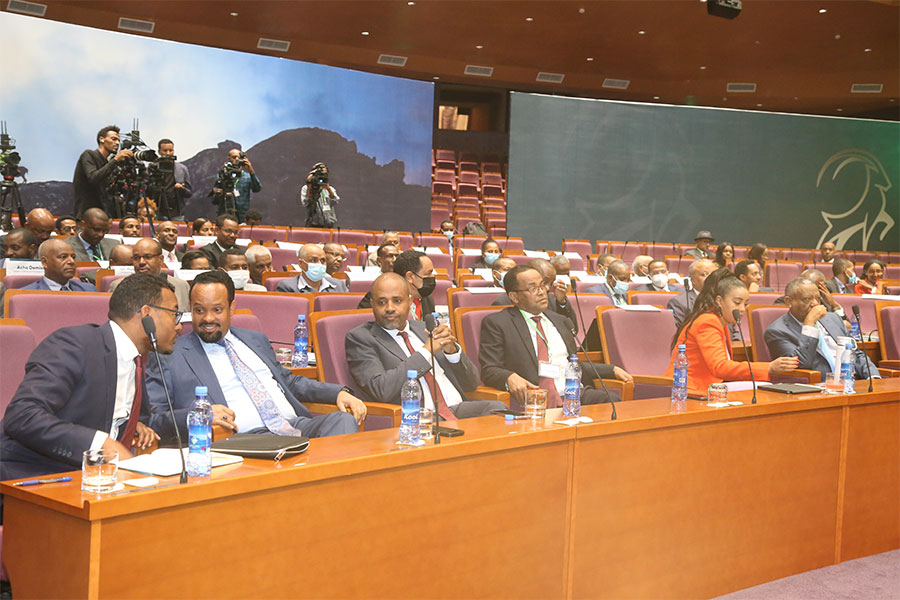
Commentaries | Mar 12,2022
May 16 , 2020
By Eden Sahle ( Eden Sahle is founder and CEO of Yada Technology Plc. She has studied law with a focus on international economic law. She can be reached at edensah2000@gmail.com. )
Early this past week, I received an invitation from my church for a blood drive being conducted in collaboration with the Red Cross. It was a great opportunity for my brother and I. We were approaching the required three-month gap since our last blood donation. The religious institution’s action was a commendable social responsibility, and their wide compound presented a space to allow people to donate while socially distancing.
Surprisingly, my brother and I were the only people who showed up as far as we could tell. It was one of many blood drives the church and the Red Cross has collaborated on. The recent one was cancelled due to low attendance.
The paranoia created as a result of the ongoing COVID-19 pandemic is evidently to blame for this. People are understandably wary about going out and having a needle put into their arms by persons they do not know. But the outbreak is just the most adverse example of the misinformation that surrounds the need to give lifesaving blood. It has got to do with unfounded fears of weight loss, high blood pressure and even death, as well as harmful cultural beliefs.
It is a tragedy this view exists when lives are lost that could have been saved.
In rural places, many people, including families, persistently refuse to give blood to their loved ones who are critically in need of blood transfusions. This results in a slew of unethical practices by professionals who are desperate to save patients. Some medical professionals give blood themselves, but it is just a drop in the ocean compared to the demand.
Masses of people need blood transfusions while they are undergoing different kinds of treatments. The fact that there is no substitute for human blood makes it all the more crucial.
Despite the common misconceptions out there, blood donation is safe and does not create any health hazard for the giver. Within a day of a blood donation, our body replaces the lost fluids and several days later restores the red blood cells.
Medical technology and production has advanced far enough that sterile disposable equipment is only used once for each donor. This makes blood donation risk free. Any chance of contracting a blood-borne infection by donating blood has been eliminated.
In the current global health crisis, the fall in the supply of blood has never been more critical than it is today. The lack of organised national blood transfusion services, supporting policies and guidance, institutional frameworks, appropriate infrastructure, trained personnel, and a system that educates and encourages voluntary non-remunerated donor transfusion continues to hamper the availability of blood for transfusion in Ethiopia.
Medical studies show that in sub-Saharan Africa the demand for blood transfusions is high because of the high prevalence of anaemia, or lack of blood, due to infectious diseases such as malaria and pregnancy-related complications, maternal morbidity and malnutrition.
To cope with the ever-growing demand, the Ethiopian National Blood Bank Service collects over 200,000 units of blood annually from non-remunerated donors. This comes to around a measly 547 units of blood on average a day. The demand though stands at 18,000 units of blood daily.
The best hope of meeting the demand lies in educating and encouraging the public to take part in non-remunerated blood donation schemes and developing strong organised national blood transfusion services to supply the chronic shortage of blood.
The collection of blood only from voluntary blood donors is vital, because it ensures the safety, availability and accessibility of blood transfusions to anyone undergoing treatment.
One way of generating donors could be organising culturally and socially appealing settings to make blood drives a festive experience to the public. Education and motivation campaigns to eradicate misinformation and harmful beliefs regarding giving blood will also go a long way. Consistently promoting blood donation and highlighting how it can save lives can ignite public compassion.
We all have the potential to make a difference in many ways. Providing the gift of life through blood donation is the best of them of all.
PUBLISHED ON
May 16,2020 [ VOL
21 , NO
1046]

Commentaries | Mar 12,2022

Radar | Nov 24,2024

Commentaries | Oct 30,2022

Commentaries | Sep 21, 2024

Radar | Feb 15,2020

News Analysis | Jun 29,2019

Fortune News | Jun 25,2022

My Opinion | Jun 29,2024

Editorial | May 28,2022

Editorial | Jul 05,2025

Dec 22 , 2024 . By TIZITA SHEWAFERAW
Charged with transforming colossal state-owned enterprises into modern and competitiv...

Aug 18 , 2024 . By AKSAH ITALO
Although predictable Yonas Zerihun's job in the ride-hailing service is not immune to...

Jul 28 , 2024 . By TIZITA SHEWAFERAW
Unhabitual, perhaps too many, Samuel Gebreyohannes, 38, used to occasionally enjoy a couple of beers at breakfast. However, he recently swit...

Jul 13 , 2024 . By AKSAH ITALO
Investors who rely on tractors, trucks, and field vehicles for commuting, transporting commodities, and f...

Jul 5 , 2025
Six years ago, Ethiopia was the darling of international liberal commentators. A year...

Jun 28 , 2025
Meseret Damtie, the assertive auditor general, has never been shy about naming names...

Jun 21 , 2025
A well-worn adage says, “Budget is not destiny, but it is direction.” Examining t...

Jun 14 , 2025
Yet again, the Horn of Africa is bracing for trouble. A region already frayed by wars...